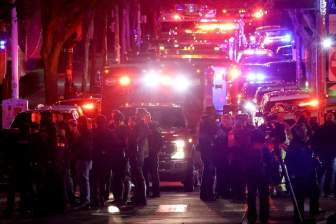Thousands of rape victims across the United States likely got pregnant in the span of less than two years, research suggests, as several states have moved to impose total abortion bans following the Supreme Court’s decision to overturn the landmark Roe v. Wade ruling.

An analysis published in the JAMA Internal Medicine journal on Wednesday estimates roughly 65,000 rape-related pregnancies occurred between July 1, 2022 and January 1, 2024 in 14 U.S. states where total or near-total abortion bans were in effect.
Out of these, the majority (91 per cent) were reported in states that make no abortion exceptions for rape cases, but nine per cent also occurred in states that have this exception in place.
To make the estimates, the researchers used national data by the Centers for Disease Control and Prevention (CDC) on rapes from 2016 to 2017.
They adjusted for the fraction of survivors who were female individuals aged 15 to 45 years using data from the Bureau of Justice Statistics (BJS) and further adjusted for the percentage of rapes that are vaginal.
“Thousands of girls and women in states that banned abortion experienced rape-related pregnancy, but few (if any) obtained in-state abortions legally, suggesting that rape exceptions fail to provide reasonable access to abortion for survivors,” the researchers wrote.

Dealing a major blow to women’s reproductive health rights, in June 2022, the U.S. Supreme Court overturned the 1973 Roe. v Wade ruling that guaranteed the constitutional right to abortion.

Get weekly health news
Since that landmark ruling in the case called Dobbs v. Jackson Women’s Health Organization, several states have imposed bans or restrictions on abortion.
Nine states have complete bans with no exceptions for rape: Alabama, Arkansas, Kentucky, Louisiana, Missouri, Oklahoma, South Dakota, Tennessee and Texas. Whereas, five states have a near-total ban, but make an exception for rape cases. These are Idaho, Indiana, Mississippi, West Virginia and North Dakota.
“The large number of estimated rape-related pregnancies in abortion ban states compared with the 10 or fewer legal abortions per month occurring in each of those states indicates that persons who have been raped and become pregnant cannot access legal abortions in their home state, even in states with rape exceptions,” the authors said.

However, in making their estimates, the researchers did note some limitations. They said while the CDC data was the most accurate available, “such highly stigmatized experiences are difficult to measure accurately in surveys.”
Disclosing a conflict of interest, one of the authors is also a plaintiff in several lawsuits challenging abortion restriction in the state of Montana and has received personal fees from the Society of Family Planning Stipend as well as grants from other groups to conduct the study.
The fall of Roe. v Wade was met with protests across the U.S. There were also concerns raised in Canada about a potential influx of Americans crossing the border for abortion care, which did not really happen.
However, advocates warn about a growing anti-abortion and anti-rights rhetoric bubbling up in Canada.
— with a file from Global News’ Sean Previl








Comments